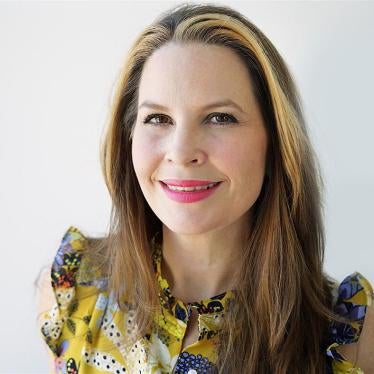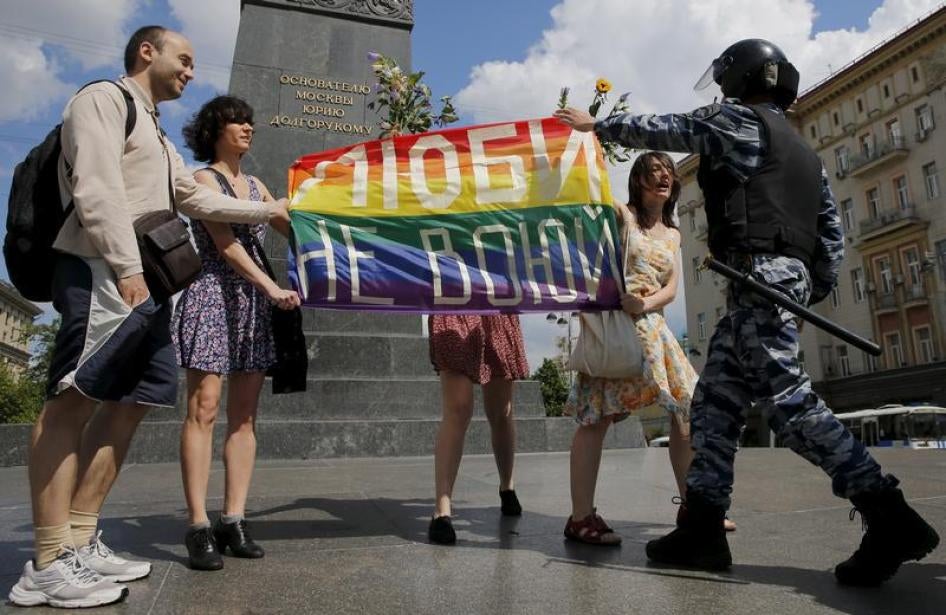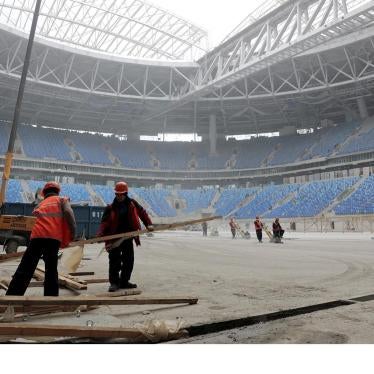FIFA, the governing body of international soccer, had a reputation problem. In 2015, Sepp Blatter, the organization’s president at the time, and other top executives were facing corruption charges and, after awarding the 2018 and 2022 World Cups to Russia and Qatar, a public backlash over those countries’ poor human rights records.
As part of cleaning up its act, FIFA agreed to require minimum human rights standards for countries that apply to host soccer competitions, including zero tolerance for discrimination based on sexual orientation.
The first test of these new policies will come on June 14 as the 2018 FIFA World Cup opens in Russia, a country openly hostile to LGBT people. Billions of fans will watch as 32 national teams play in the premier global soccer competition in 11 cities across Russia. The World Cup is meant to be a joyful celebration of sport and humanity. Yet many LGBT people will not be celebrating the games.
FIFA needs to make clear now that it expects Russia to abide by its rules during the tournament. Establishing human rights policies was a vital first step for FIFA. The hard part is implementing them, especially with repressive prospective hosts who intend to “sportswash” their international images.
June will mark the fifth anniversary of Russia’s discriminatory anti-gay “propaganda” law. Adopted months before the 2014 Sochi Olympics, the law penalizes LGBT advocacy and creates a dangerous climate of stigma and violence for LGBT people. Anti-gay violence has increased so much in Russia that F.A.R.E., an organization that works to counter discrimination in soccer, warned fans attending the World Cup with their same-sex partners not to hold hands in public.
In 2017, the Russian republic of Chechnya carried out a horrific anti-gay purge. Chechen security forces rounded up suspected gay and bisexual men, torturing them and kidnapping some. “We don’t have any gays,” Chechnya’s ruler, Ramzan Kadyrov, said to HBO last year. “To purify our blood, if there are any here, take them.”
Instead of speaking out, FIFA is at best turning a blind eye to such homophobia and, at worst, rewarding it. The organization placed Grozny, the Chechen capital, on a list of World Cup training sites.
Qatar, which punishes gay people with one to three years in prison, will be the next World Cup host, in 2022. And on June 13, FIFA will vote between a joint United States-Canada-Mexico bid and Morocco to host the 2026 cup — even though Morocco’s national penal code punishes same-sex relations with prison terms. The law has resulted in numerous arrests in recent years, including of two teenage girls in 2016 for kissing.
These anti-gay laws clash with FIFA’s statutes, which warn that discrimination of any kind “is strictly prohibited and punishable by suspension or expulsion.” As part of a two-year process of implementing the rights reforms promised in 2015, FIFA’s president, Gianni Infantino, created the organization’s first human rights policy, which says that FIFA “is committed to addressing discrimination in all its forms.” Mr. Infantino also agreed to apply the United Nations guiding principles on business and human rights across all operations.
FIFA claims it will act on violations. “If there are any cases of abuse, or even possibility of human rights defenders or journalists being forced into a difficult corner, then according to our statutes and human rights policy, FIFA will intervene,” Federico Addiechi, FIFA’s head of sustainability and diversity, told The New York Times last year. In a 2017 letter on Chechnya’s anti-gay purge to activists, the secretary general of FIFA, Fatma Samoura, wrote that the organization’s events need to be “discrimination-free environments, including concerning discrimination based on sexual orientation.”
Hosting the World Cup entails trading away some sovereignty. FIFA has demanded and been given changes to domestic laws ahead of past World Cups. South Africa set up dozens of “instant courts,” chiefly to prosecute petty crimes related to the tournament, and Brazil overturned legislation that banned beer in stadiums. This kind of pressure should be used to further basic human rights.
FIFA needs to say publicly to Russia that it expects a welcoming atmosphere for LGBT people at all World Cup events and make clear that the country will be held responsible for conveying that message to all of local officials and staff, at the matches and beyond the playing fields.
This would send a strong signal to countries like Qatar and Morocco that they won’t be able to host major FIFA tournaments unless they reform anti-LGBT laws and policies.
If FIFA is not able to enforce its rules, top sponsors should act. Coca-Cola, Adidas, McDonald’s, Visa and other multinationals with policies banning discrimination need to protect their own reputations by insisting that FIFA live up to its promises. McDonald’s has already expressed “concerns to FIFA regarding human rights issues in Qatar,” and announced it will not be a World Cup sponsor after 2018.
Thinking beyond Russia this year, FIFA needs to put Qatar on notice that four years is enough time to repeal its anti-LGBT laws, and to make the requirement public and essential in selecting future hosts. In short, FIFA needs to say: If you can’t play by the human rights rules, you can’t play.







